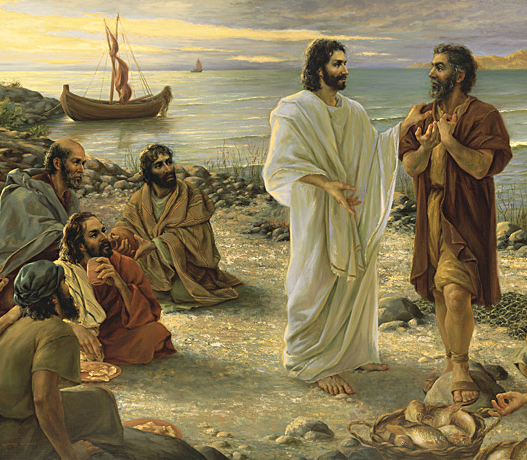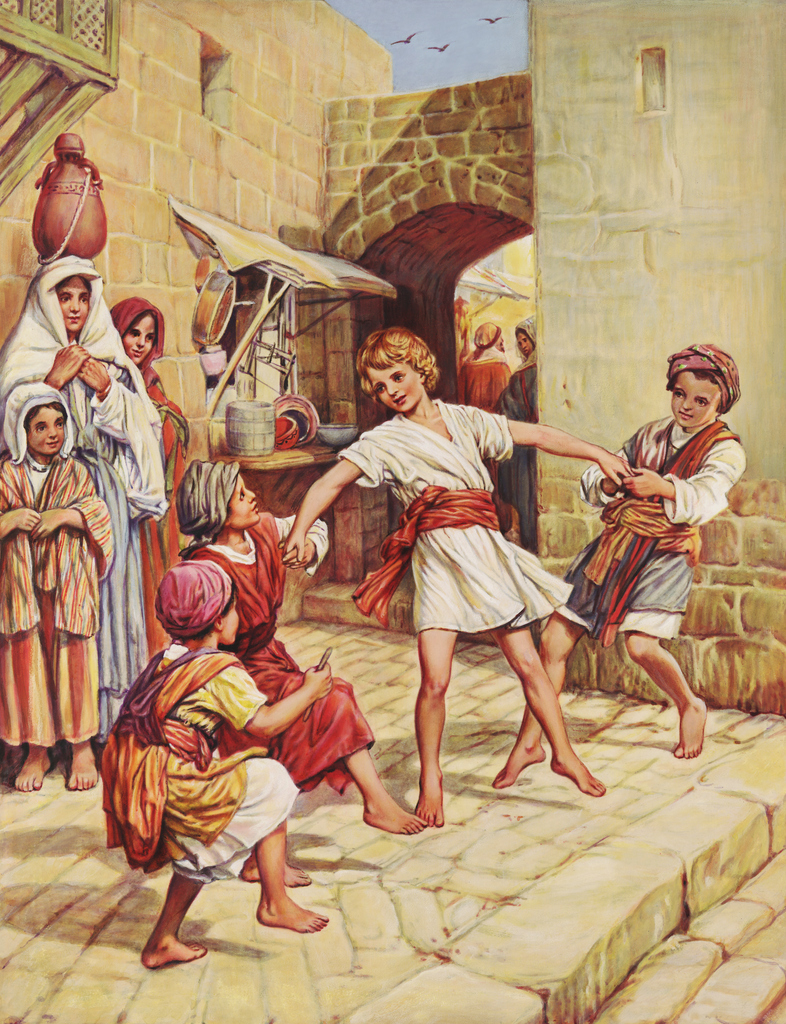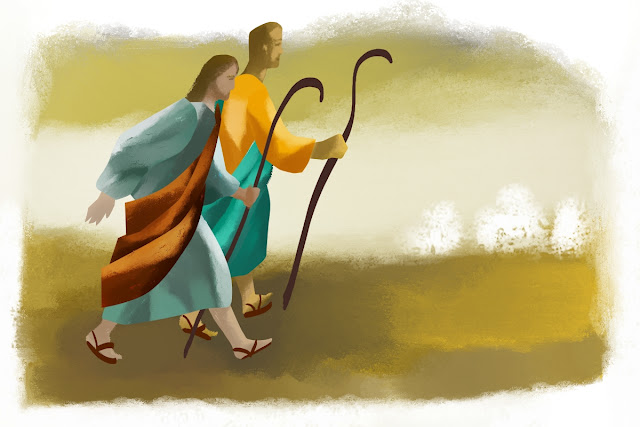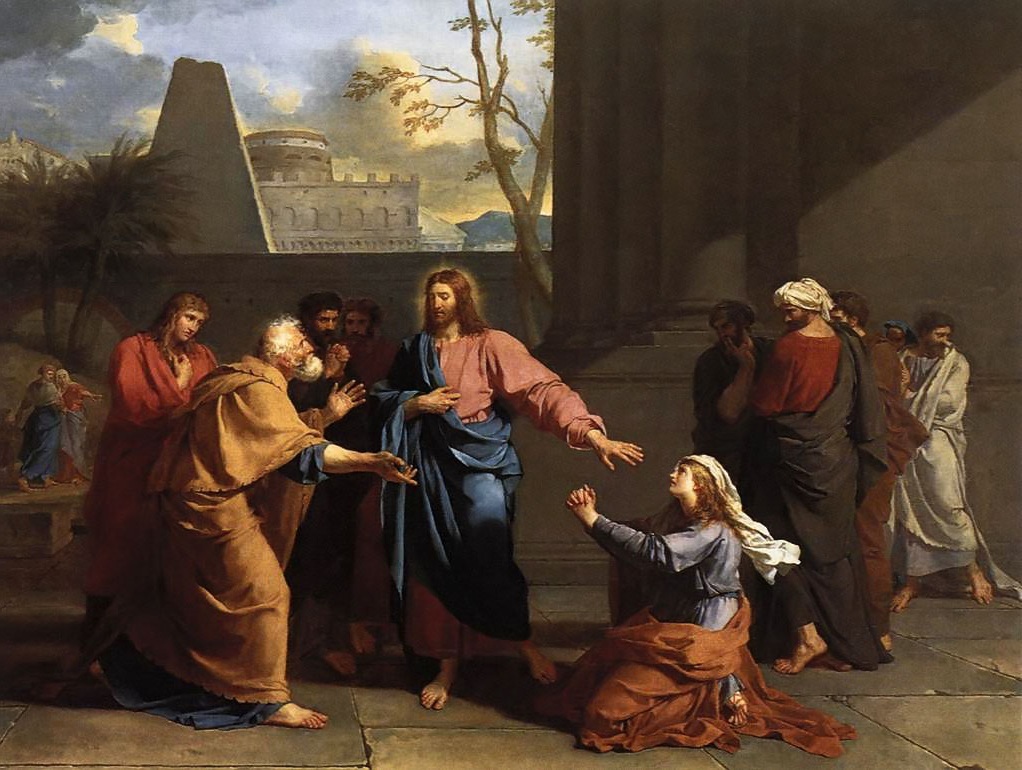 A few weeks ago I went to a bible study at my parish where we studied the readings from the upcoming Sunday. The gospel reading was the one where Jesus asks his disciples who he is. “Some say John the Baptist, others Elijah, still others Jeremiah or one of the prophets,” say his disciples. Then Jesus asks Simon Peter. “You are the Christ, the Son of the living God,” he responds. Jesus then renames him Peter and says the church will be built upon Peter and that he has the keys to the kingdom of heaven.
A few weeks ago I went to a bible study at my parish where we studied the readings from the upcoming Sunday. The gospel reading was the one where Jesus asks his disciples who he is. “Some say John the Baptist, others Elijah, still others Jeremiah or one of the prophets,” say his disciples. Then Jesus asks Simon Peter. “You are the Christ, the Son of the living God,” he responds. Jesus then renames him Peter and says the church will be built upon Peter and that he has the keys to the kingdom of heaven.
Traditionally, this reading has been interpreted as Jesus testing his disciples and because Peter’s faith gave him the right response he inherited the leadership of the church. I had read another interesting interpretation from John J. Pilch, a biblical scholar from St Louis University. He notes that Jesus’ mediterranean culture is not as individualistic as our own. In Jesus’ culture, who the community says we are is critical to our identity. Jesus was continuing to discover his identity so he asked his disciples who the community said he was, and in gratitude for Peter’s response he offers him the gift of opening the kingdom to others and leading Jesus’ mission.
After I shared this interpretation a number of people in the bible study took issue and said that Jesus didn’t need to discover his identity; he was God! They believed that since Jesus was divine he knew that he was God, even from the age of five, even from the crib! In 451 the Council of Chalcedon defined the dogma that Jesus was fully human and fully divine. It’s called the hypostatic union. He was not God “in human disguise.” Jesus was not only divine and indeed the Second Person of the Trinity, but also fully a human being like you and me. He had to learn how to walk and speak and read. He had to learn about the Jewish law and learn about carpentry. Eventually he had to figure out what precisely his mission was from God. Did he know immediately he was God from the moment of birth? I’m not so sure.
 But wouldn’t Jesus being fully divine have known everything? That approach seems to make Jesus less than fully human, not a Jesus we can relate to. We don’t know what it’s like to be fully divine but we do know what it’s like to be fully human. Being human means being limited and having to learn about oneself. Like us, Jesus taps into his divine part through constant prayer to his Father and the reading of the scriptures. Scholar J.H. Wright once wrote, “It was the Old Testament which helped Jesus understand Jesus. Who did he think he was? What did he think he was to do? The answers came from his Bible…”
But wouldn’t Jesus being fully divine have known everything? That approach seems to make Jesus less than fully human, not a Jesus we can relate to. We don’t know what it’s like to be fully divine but we do know what it’s like to be fully human. Being human means being limited and having to learn about oneself. Like us, Jesus taps into his divine part through constant prayer to his Father and the reading of the scriptures. Scholar J.H. Wright once wrote, “It was the Old Testament which helped Jesus understand Jesus. Who did he think he was? What did he think he was to do? The answers came from his Bible…”
The Spiritual Exercises devotes a meditation to the “hidden life” of Jesus, those years between ages of 12 and 30. After his time questioning the rabbis in the Jerusalem temple (to the dismay of his parents), all the scripture says is: “And Jesus increased in wisdom and in years, and in divine and human favor.” (Luke 2:52) I prayed with this when I made the Spiritual Exercises and I’d like to share my journal entries from my imaginative prayer. Note how much scripture plays an important role in Jesus’ learning about himself.
I saw Jesus slowly growing up, at five or six Joseph teaching him about creation and the exodus… And reciting Psalm 139. Jesus seemed keen and interested. He helped his mother skin a chicken for supper around the age of seven or eight. He played with neighbourhood friends, one day coming home with a twisted ankle as he tried not to get hit by a runaway cart. Mary comforted his tears. Around 13, since he was becoming a man, Joseph taught him carpentry. When asked what he wanted to make he first thought of Moses and the parting of the Red Sea and said, “A staff!” He ended up choosing to make a shelf on which he put his religious books and stories from the prophets. Jesus was captivated by the teachings he heard at the temple. In his teenage years when his friends were eyeing girls he was captivated by his books and prophet stories. He loved to read and imagine and hear stories (since books were scarce). In his late teenage years he realised that a lot of prophecy related to his life. One day while helping his dad he asked Joseph if he ever thought he was made for something different, like if he was made to be a carpenter. Joseph had Mary speak to him. She told him of the Annunciation and all they’ve gone through. It all made sense. They had done a good job of blending in and keeping his identity quiet. Much of this time he prayed a lot to Yahweh, seeking his will. It was being revealed… His 20s were a time of prayer and observation. He saw things of the Law that began to bother him and not make sense. His mission was becoming clearer. His intimacy with the Father was growing and all he had learned in his faith from his parents and in temple was coming to fruition. The Lord was working all this through human means and all the experiences he’s had, his parents’ teachings, his learnings of the prophets…
The next day my retreat director had me do a repetition so I went back again to pray with Jesus’ hidden life to see what more would come. Here’s my next journal entry:
My prayer began with Jesus asking his mother at the table who God is to her. He knew God went far beyond what he read in the psalms. He asked how to pray and to listen to God’s answer in the ordinary things. He went with his friend Daniel often to the temple to hear what the rabbis were teaching. He would reflect on it, and pray about it. He said he’d meet up with Daniel after and found a spot under a tree to pray. He continued to ask his Father to reveal his will and to help him see it. As he walked through a market he was amazed at all the kinds of things God had created in love for us. Then he saw a beggar and people were kicking up dust in his face. Jesus was moved with pity. Some kids he knew told him to join in but he kept walking and went back home. Again he prayed. He had seen even how the teachers of the Law treated beggars like that. He asked his parents about this and they explained that these people (beggars) are seen as unclean and are punished for their sins. It didn’t seem to make sense from a loving God. In his prayer the next day he felt the Father call him back to the beggar on the street to make eye contact with him. So he went back and when he saw the man, he smiled. You could sense the power Jesus’ smile had on the man. Jesus was amazed, too. He went on and joined some friends for some outdoor games. A girl fell and scraped her knee and began to cry. Jesus saw this and while the other kids were laughing he ran over and just naturally, without thinking, put his hand on her wounded knee and in simple prayer quietly prayed to himself. “Father, heal her.” When he removed his hand, the scrape was gone and the girl stopped crying. Not realising, she looked at her knee and said she had thought she had skinned it. In this moment Jesus saw the power he had and instead of continuing to play, ran to the temple to pray and hear the scriptures – maybe there was an answer.
God continued to reveal Jesus’ mission and desires through experiences like these. Jesus got to a point where his will and his Father’s were one. Every action was influenced by his prayer and the Father. It was time to take the step to go public. He had knowledge of the Scriptures and the Law. He knew how to pray and how to listen, and he had simply to ask his Father for something and it was done. This union and alignment between the Father and Son had come to fruition. He sat down with his parents and explained all this to them. They knew the time had come to let him go. They could hardly believe the time had finally come.
After these prayer experiences I realised Jesus had to grow into his vocation and identity and it was prayer and ordinary things that God used to communicate with Jesus. Through prayer and listening he came to a place where his full divine identity had been revealed through his human identity. We must be careful in making Jesus into Superman. Unlike Superman, Jesus was limited by his human body. His miracles and healings and other graced abilities came through his faith and relationship with his divine Father. Was Jesus God? Yes. But God cared so much about knowing human experience that God came to experience humanity not partially, but fully, with all its heartaches, knee scrapes, struggles, and wonders.
Related post:
Listen to an audio version of this post…
Music by Kevin MacLeod and audionautix.com









Andy
One of your best! The content’s great but also you are guiding us into the freedom and beauty of imaginative contemplation.
Thanks for letting us take a peak into your prayer life.
Paul
Yes, thank you for sharing your journal with us. I have always found it quite difficult to imagine Jesus’ hidden life. You make me want to ask Him to show me how his youth was 🙂
Thank you.
Thank you. I hope to use this in RCIA when we talk about “Jesus: is He real?” I especially liked the healing of the little girl—so much like us not recognizing when Jesus is ‘touching’ us—-until it is over. Thank you again.
Even before I became Catholic, I applied my Protestant imagination to such questions as these. I suppose I was entering into my own intuitive form of Exercise. I would apply all senses to my “being there”. I have many times wondered about those missing years. Your journal entries ring very true: I’ve been in that Gospel too. Thanks!
Jay Kronenberg
Cranston, RI
When I go to heaven, I will ask Jesus to take me on a tour of his life, from beginning to end. I will have the best guide – the leading character Himself.
It strikes me that our Friend did not come to reveal Himself. At one point He says ‘no one knows the Son but the Father and no one knows the Father but the Son, and anyone He choses to reveal Him to.’ A man ‘like us in all ways but sin’ yet He does not use His life’s events and experiences to teach us. Instead, remaining ’emptied’ He tells us the Father’s story ‘with authority’ or as one face to face with the Father. He speaks to me ‘of the Father’ in the first person. We cannot ‘hear’ the Father directly, for He is unbound by space and time. Our lack caused us to use many confusing images and many ambiguous words. And so our Friend taught us to use a title that can only be conferred by a child: “Abba” to understand how God desires us to enter into a proper relationship with Him.
Your prayers, walking with our Friend, are very revealing. I believe Jesus uses such prayer to give us the kind of understandings revealed in those journal entries. Prayer is also living word. And your prayers, following in His light, are also quite evocative, bringing each of us a new sight.